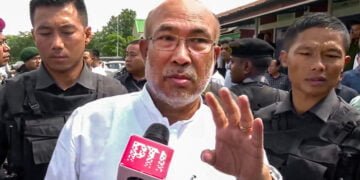The recent Rajya Sabha elections in Himachal Pradesh, Uttar Pradesh, and Karnataka have laid bare a concerning breakdown of ethical standards in our nation. Rather than being isolated incidents, these events reflect a disturbing trend that is becoming the norm. As the world’s largest democracy, we are rapidly descending into a state of political unethicality. It is evident that our democratic integrity is under serious threat, and immediate action is required to implement comprehensive electoral reforms and sever the unhealthy connection between unaccounted money and politics.
After a prolonged anticipation, the Supreme Court (SC) has finally invalidated the legality of electoral bonds. This decision stands as the correct course of action, given that these bonds failed to address the intentional lack of transparency regarding anonymous money in politics. The only noticeable change was the shift to making donations through bank transfers, while everything else remained unchanged or, in some aspects, deteriorated. The identity of the donor and the receiving party remained undisclosed, the funding limit was eliminated, and previously restricted donations from foreign sources became unlimited.
As affirmed by the Supreme Court, the entire electoral bond scheme was nothing but a deceitful ploy presented to the voters under the guise of reform. While the court’s decision is certainly a positive step, it falls short of providing a comprehensive solution to eradicate the involvement of black money in politics — a seed from which all corruption in India stems. Simply discarding the electoral bond scheme risks reverting to the previous system where cash transactions occurred discreetly, compelling corporations to engage in unethical practices that contribute to the generation of black money.
The Election Commission (EC) has persistently advocated for numerous reforms. Presently, candidates are obligated to reveal their assets and liabilities, yet political parties are exempt from this requirement. As early as 2004, the EC put forth the recommendation that “political parties should annually disclose their accounts for public scrutiny, facilitated by the maintenance of these accounts and their auditing through an approved firm by the Comptroller and Auditor General to ensure accuracy.” Regrettably, this proposal has never been implemented.
The Election Commission (EC) has also suggested that all payments to political parties should be conducted through digital means or crossed account payee cheques, ensuring transparency in both the donor and recipient identities. Unfortunately, this recommendation remains unexecuted.
Given the widespread digital revolution, it’s reasonable to propose a law mandating all party donations, regardless of amount, to be exclusively made through digital channels and made accessible on a public website. This approach, akin to “crowd funding,” via transparent digital contributions, is entirely feasible. Bernie Sanders successfully tested a similar model in the US presidential elections of 2016 and 2020, enabling the public to question the sources of unaccounted money when parties engage in extravagant electioneering or horse trading.
The original purpose behind the anti-defection law has been reduced to a mockery, with elected representatives frequently and haphazardly switching parties, individually or collectively. Governments have been overthrown through horse trading, and parties with a minority miraculously transform into majorities. This shameful scenario is fueled by vast amounts of black money, where elected representatives allow themselves to be auctioned to the highest bidder. In their actions, there’s no semblance of loyalty to ideology, idealism, or political allegiance. They can seamlessly transition overnight from vehement critics to ardent followers of a leader or party.
This lamentable situation has instilled a sense of disgust in the common person, whose emotions oscillate between anger and resignation. A corrective measure is urgently required to restore people’s faith in the integrity of the democratic process. While solutions are evident, the challenge lies in finding someone willing to take the initiative. For example, implementing a law stipulating that any elected representative who, after winning on a particular party symbol, changes allegiance must resign and contest elections anew could be a step in the right direction.
The Election Commission (EC), entrusted with the crucial responsibility of overseeing the electoral process impartially, fearlessly, and meticulously, seems to be considerably weakened. In a March 2023 judgment, the Supreme Court proposed a selection process for election commissioners involving a committee comprising the Prime Minister, the Leader of the Opposition, and the Chief Justice of India (CJI).
However, the government enacted a law that excluded the CJI and replaced the third member with a Union minister appointed by the Prime Minister. Consequently, the government retains a perpetual majority in appointing all three election commissioners. The question arises: Why should any ruling party have the authority to influence the composition of the EC, particularly when, according to the Constitution, it is intended to be an independent body?
For any democracy to adhere to the rules of the game, it requires an impartial and ethically steadfast ombudsman. While the Election Commission (EC) is constitutionally tasked with this role, its tendency toward non-intervention raises concerns about who will ensure the stringent implementation of the model code of conduct for elections.
The foundational principles of this code emphasise avoiding activities that exacerbate existing differences, create mutual hatred, or cause tension among different castes, communities, religions, or linguistic groups. It also urges against criticising other parties based on unverified allegations and prohibits the appeal to caste or communal feelings for securing votes. If the EC falls short in guaranteeing adherence to these principles, can the Supreme Court step in? After all, it is within the SC’s mandate to protect the ‘basic structure’ of the Constitution, wherein democracy and free and fair elections stand as central pillars.
There exists an unspoken collusion among our political parties, united in their resistance against electoral reforms due to vested interests in maintaining the outdated and corrupt system. In the end, it falls upon the citizens, the unfortunate victims of this deplorable situation, to declare unequivocally: “Enough is enough!”
(The writer can be reached at dipaknewslive@gmail.com)
























